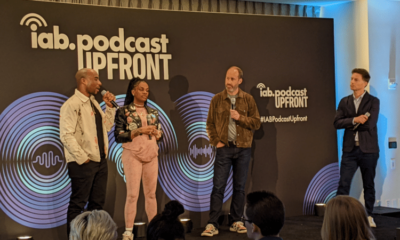SEO
Lessons From 10 Female Leaders To Inspire Your Professional Journey
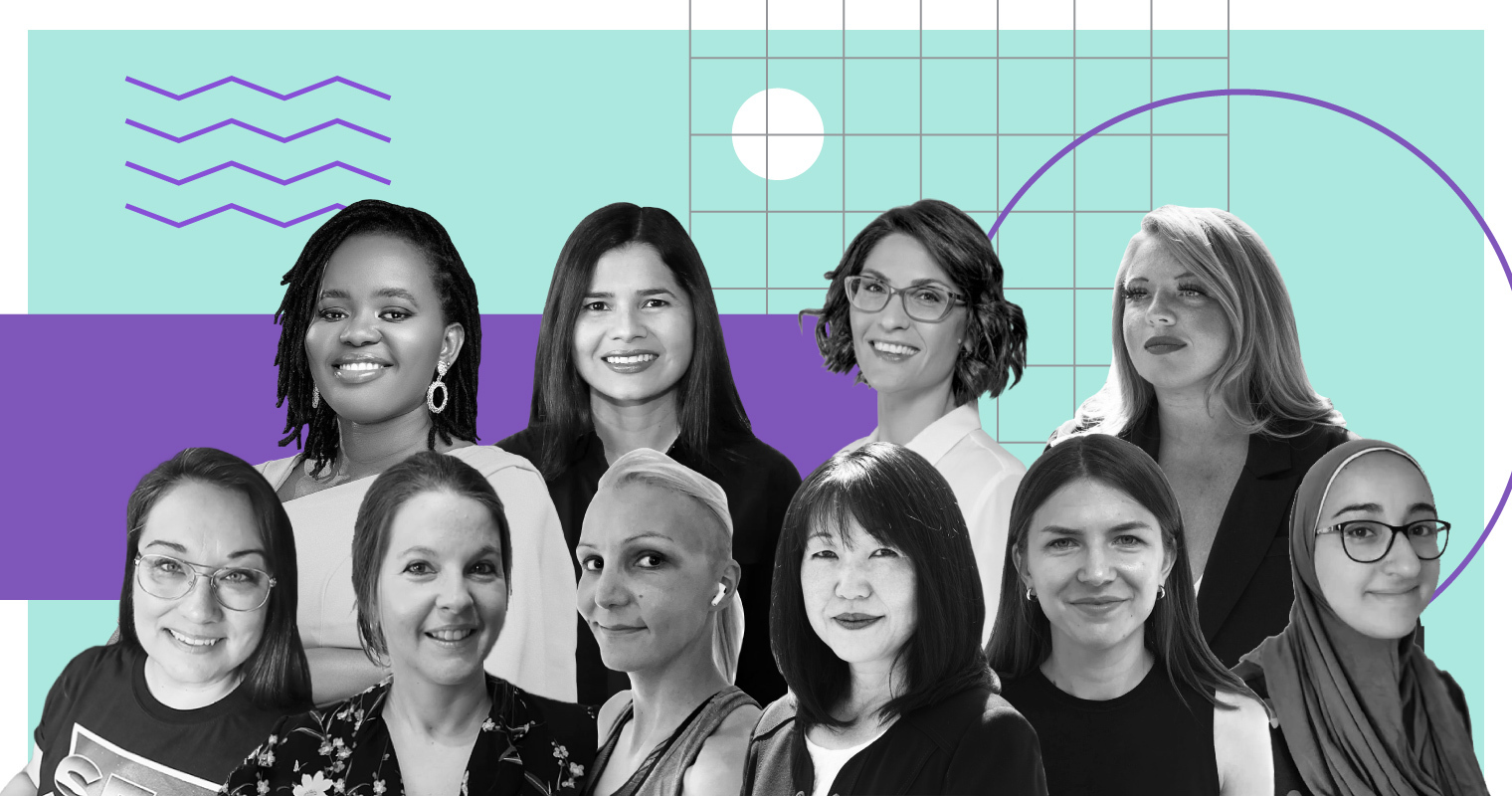
Being a member and supporter of the Women in Tech SEO community, SE Ranking – which is an all-in-one, comprehensive SEO toolkit – is on a mission to make SEO accessible for everyone.
As we want to encourage female marketers to succeed professionally, we interviewed 10 prominent women in SEO and digital marketing.
These experts shared their outstanding experiences and life lessons, and we’re excited to share their wisdom with you.
Discover how to build leadership skills, overcome obstacles on your professional journey, and build success and resilience in your work life with these tips and advice from inspiring women leaders.
1. Encourage Telling People What They’re Worth
Carrie Rose, Founder Of Rise At Seven
The biggest obstacle on my path to success was earning the right to be trusted, respected, and backed as someone of young age at the time.
To combat this, I focused on being confident in my abilities and proving my worth through my work. This involved spending 50% of my time with clients and the other 50% doing the actual work, as well as freelancing to learn how to work independently without extensive resources.
This set me up for success, allowing me to start and scale my own agency to generating £7m a year in just 3 years, and I continue to stay involved in the work to this day as the Founder and CEO.
In the business and career world, I have faced gender discrimination beyond my expectations, as women statistically face more obstacles in achieving success, leadership roles, investment, and building a Fortune 500 company.
Even when launching my own agency with a male co-founder who owned an equal percentage of the business, the hate and negativity I got was on another scale.
I found that my opinions or case studies were questioned, and people were in disbelief at the results. I got a “prove it” response, whereas when my cofounder posted the same results, he got a “Congrats, great work.”
In terms of money, I have a slightly controversial opinion on the pay gap in the industry. Do I believe it exists? Yes. In my own case, I was paid less than a male coworker who started within the same two weeks as me, had the same experience, etc.
However, now being a founder, I can see an issue I believe to be true. I’ve found women are natural givers. They have “motherly” traits and do things because they care. And as a result, don’t ask for more money by doing more.
On the other hand, men are less likely to give for free. And more confident to ask for pay raises or higher salaries. This is a real issue. Therefore, here are some ways to overcome it:
- Encourage telling people what they’re worth. I’ve had many instances where I have offered a higher salary to people because I believed they were worth it. I gave them the confidence to know and understand their personal value and be open enough to talk about salaries.
- Create yearly pay review meetings with salary benchmarks for the industry. I think we as leaders need to give our staff the data they need to be confident to ask.
2. We’re Here To Amplify The Work Of Brilliant Women In The Industry
Areej AbuAli, Founder Of Crawlina & Women In Tech SEO

A few years ago, I was truly struggling to fit into the SEO community, and I wasn’t feeling motivated in the industry. I used to attend conferences but did not see myself represented, and I wasn’t too sure if it was a career path that I wanted to continue in.
I remember hearing about a few “exclusive” groups; you needed to be ‘invited’ to be a part of them or know someone. It just didn’t feel right.
So, I decided to start my own thing. I put out a call saying, “Women in Tech SEO, rejoice, we now have our own group.”
This was back in May 2019 – right away, I was surprised by how many people joined. It was over 100 in only 2 days. I made sure that we had rules and values in place.
Everyone who identified as a woman was more than welcome to join; it didn’t matter if they were starting out their SEO career or they had been in it for over a decade.
In other words, Women in Tech SEO is a global community for women in the Technical SEO industry; It’s a safe space for women to connect, learn and support one another. We’re here to amplify the work of brilliant women in the industry.
3. Believe In Yourself Because You Can Do It
Olga Zarr, CEO At SEOSLY

I know a lot of people who work at SEO agencies, and very often, women with more experience earn way less than their younger and less experienced male colleagues.
I have noticed that this is because they don’t dare ask for a raise and, when applying for a job, are afraid of asking for too much, fearing that they won’t be hired.
My piece of advice is to always talk about all your skills, including the ones you have not completely mastered (I noticed a lot of women won’t admit that they know something because they don’t know it perfectly, while males will often say they are experts at something they barely know).
And another tip is to always ask for way more than you think you should ask because your mind is most likely undervaluing you. Don’t get fooled by it.
Also, to help freelancers know their worth and be paid as much as they deserve, together with Myriam Jessier, we created SEO Cash Flow, which aims to help underrated freelancers earn more.
On the whole, my advice is to believe in yourself because you can do it. If you’re just beginning your journey, start by reading the Google SEO documentation from cover to cover.
Make sure to become part of the Women in Tech SEO community. Follow other female SEOs like myself, and don’t be afraid of reaching out to them. Most of them (if not all) will be happy to help you and give you free advice.
4. You Aren’t Alone – Let’s Help Support Each Other!
Tory Gray, Founder Of The Gray Dot Company

My biggest struggle on the way from an SEO specialist to a company founder has been about learning to trust myself, listen to myself effectively, and be willing to try and fail – and try again while also not ignoring or forgetting the needs of others.
When it comes to being an in-demand professional – soft skills – that’s where I see most growing SEO professionals lacking today.
There’s too much focus on gaining a specific, technical hard skill that will somehow magically make them feel confident and successful. In reality, most SEO pros need to learn how to be influential, impactful, and empathetic.
This all said, I do think it’s important for women specifically to focus on having a technical or data-focused hard skill of some sort. This is largely practical: Too often, women’s opinions and contributions are brushed aside.
Being better at a specific skill (or a few!) vs. the men in the room is the single biggest way to be heard and make room for yourself. You bring the data, you bring the informed analysis, and they have to listen to you. To be clear, this is not good or right, but it is a reality I’ve experienced.
If you’re just starting your career in the SEO industry, find a mentor! And a support group of women to talk to, learn from, and grow with. As the most important thing is knowing you aren’t alone – let’s help support each other!
5. Don’t Hesitate To Ask For More; You Deserve It!
Anastasia Kotsiubynska, SEO Team Lead At SE Ranking

I guess the most challenging part of becoming a team leader is when you become responsible for people, processes, and results.
That’s why to make progress, switching to a business-owner mindset is needed. This helps to see a wider perspective of how you can grow the company through what your team and you do.
But even if you are not in a manager position, leadership skills are important. To make things happen, you need to take responsibility, even if you’re not 100% sure you can handle situations and lead processes or people – if there’s a need or an opportunity to do this.
But the thing is, despite having remarkable abilities, one cannot be completely immune to bias in the professional setting.
Unfortunately, I’ve faced obvious sexism at one of my previous workplaces, where my manager used to say things like, ‘Women cannot think so effectively and be so technically wise as men.’
Some would expect the advice to prove the opposite with your work. But usually, it’s very hard to change people who build such an unhealthy discrimination-friendly environment – you might just end up having your self-esteem negatively affected.
Another problem is that often women in SEO get lower salaries than men, so they earn less because they tend to ask for less.
Just don’t hesitate to ask for more; you deserve it, but it is helpful to back up your request with solid arguments, data, and achievements.
6. Don’t Give Up! Take Help And Support From Other SEOs
Ulrika Viberg, Founder Of Unikorn & SEOGIRLS

Grabbing a chance really means creating an opportunity and working hard until it evolves into the next thing. Being a middle-aged woman in the SEO industry certainly didn’t give me any freebies, either.
I started working in the mid-’90s when we had a completely different working atmosphere in terms of gender equality. Things have changed since, even if we feel it hasn’t changed enough.
Even if it has become better over the years, women still experience not being listened to or taken seriously and being questioned whether they know what they are talking about.
Women in SEO often find their knowledge being tested every now and then like it’s an unannounced pop quiz. In the past, I dealt with it the way we women did then: by coming more prepared than our male colleagues. Working harder, reading up on matters more carefully, and walking two extra miles.
While I think this is still true, we have become much better at supporting each other, lifting brilliant women in the community, and opening up to discuss these discriminations publicly. All of this helps.
So, if you’re just starting your career, my advice is: Don’t give up! Take help and support from other SEOs!
Reach out to Women in Tech SEO and other communities for women in SEO, like SEOGIRLS in Sweden, which is a safe place for women to discuss SEO without experiencing mansplaining or being talked over by male colleagues.
We are there for you to support you in your journey!
7. The Goal Is To Remove Or At Least Minimize Discrimination At Work
Motoko Hunt, Founder Of AJPR

Besides having the skills to perform SEO work at an excellent level, you need to have good management, adaptability, curiosity, and critical thinking skills. At the same time, you don’t need to be a Jill of all trades. Instead, find the niche that separates you from others.
However, even the most exceptional skills cannot provide absolute protection from workplace discrimination. I have experienced both gender and racial discrimination, not just in my current work but also in my previous jobs.
That comes in different ways and is not always an “in your face” incident. For example, when I was ready to go on an important business trip, the management felt it was for men only as I had children.
I believe the goal is to remove or at least minimize discrimination at work. Though it’s important to let them know that it’s a problem at the time of the incident.
Rather than just react, I suggest you document them and discuss them with the management and HR. If other employees are experiencing similar problems, doing this as a group will give you a bigger voice.
Another problem is the payment gap between men and women, which is not unique to the SEO industry.
So, when you need to negotiate anything with the company, you need to prepare. When you discuss the salary (or the promotion), “I’ve been working hard” or “I deserve more” aren’t the best way to approach it.
You have a better chance of succeeding in the negotiation if you can quantify your value to the company, i.e., the increase in conversions/sales your work brought to the company.
8. Show Your Worth And Ask For More!
Aleyda Solís, Founder of Orainti

Sadly, the SEO industry’s payment gap between men and women is certainly there. How to deal with it? Show your worth and ask for more! What’s the worst that can happen? That they say no? Perfect – ask for more!
If you want to succeed in the SEO industry, I would recommend having an overall knowledge of the SEO process, how it all works, and every activity/area that influences it: how a search engine works, how people search, crawl, indexing, content relevance, link popularity, etc.
Then, depending on your skills and preferences, you might want to focus on technical SEO, content optimization, link building, or in a specific area, like local SEO or ecommerce SEO.
Whatever you choose, ensure you understand how it works from a tactical standpoint and how it aligns and fits from a strategic one to the whole SEO process.
Then, learn about communication, prioritization, coordination, influence, and project management, which will allow you to successfully sell and manage SEO processes, whether as an external solo consultant, in an agency, or in-house. These are critical skills.
I highly recommend those looking to learn more about SEO take a look at LearningSEO to go through all of these areas and learn about them.
And at work, remember to always be professional, show up and do what you said you would do, and commit and focus on your project’s success and your own as a professional!
9. Be Your Own Biggest Advocate
Chima Mmeje, Founder Of The Freelance Coalition For Developing Countries

I don’t think there’s any woman in any industry who hasn’t experienced gender discrimination. It’s sadly a part of our lives.
I feel like some men speak to women in a condescending tone they wouldn’t use with other men. I hear it in the way they cut me off when I’m speaking, brush off my ideas, or try to mansplain something to me.
I try to establish authority early in the conversation to show my expertise. I share my ideas and encourage mutual respect if we’re to have a healthy working relationship. Most importantly, I advocate for myself to ensure my voice is heard when I’m in the room because commanding authority leads to respect.
If you want to achieve outstanding results in your professional life, listening has to be at the top of the list for soft skills. Hard skills depend on your industry, but everyone should learn to write. It’s such an underrated skill, even for developers and technically inclined folks.
You can build a personal brand when you know how to communicate with your preferred audience using words they connect with.
Also, staying nimble, especially in the age of AI, is an essential skill. We need to constantly learn how to use AI as a friend to improve our current processes instead of ignoring it because it’s not going away.
What advice would I give to women who want to succeed in their SEO careers? Just get in there! There’s nothing to be afraid of. Ask questions, even when it sounds dumb in your ears.
Build your own website and use it as a testing ground to improve your skill. Document your progress in public so people can help you along your journey.
Be your own biggest advocate because you’re working in an industry where people will question your authority and skills every step of the way.
10. Ask, And People Will Help You
Jo Juliana Turnbull, Founder of Search London and Turn Digi

In our industry, the hard skills that help to succeed are knowing the area you want to specialize in or having a broad knowledge of SEO.
Technical SEO, on page optimization, and digital PR require learning on the job and/or taking a course with a supportive team member to answer your questions.
One of the biggest soft skills is the determination to keep learning. I talk a lot about soft skills, and these are the ones that are important to SEOs (and in many industries).
- Emotional intelligence: Self-awareness, self-regulation, motivation, empathy, social skills.
- Communication: Be a clear communicator and be aware of nonverbal communication.
- Empathy: Ability to understand and sense other people’s emotions.
- Active listening: Conscious efforts to hear the words and engage the speaker.
- Confidence: The feeling one can do a task well.
Overall, learn as much as you can, and find a good support system and a great mentor. If you do not know something, ask, and people will help you.
I would also recommend taking the CliftonStrengths Assessment. This way, you can find out your natural strengths, which, when you work on them, turn into your talents.
To sum up, if you’re a female marketer and want to succeed in the SEO industry, you need to:
- Be brave enough to stand up for yourself.
- Value your skills, experience, and expertise, and never stop evolving.
- Don’t be afraid to ask for more.
- Network with other professionals in the industry. The people you connect with will become your friends and mentors with whom you can share your struggles and happiness.
- Remember that people are always here to support you.
More resources:
Featured Image from author
SEO
How To Use ChatGPT For Keyword Research

Anyone not using ChatGPT for keyword research is missing a trick.
You can save time and understand an entire topic in seconds instead of hours.
In this article, I outline my most effective ChatGPT prompts for keyword research and teach you how I put them together so that you, too, can take, edit, and enhance them even further.
But before we jump into the prompts, I want to emphasize that you shouldn’t replace keyword research tools or disregard traditional keyword research methods.
ChatGPT can make mistakes. It can even create new keywords if you give it the right prompt. For example, I asked it to provide me with a unique keyword for the topic “SEO” that had never been searched before.
“Interstellar Internet SEO: Optimizing content for the theoretical concept of an interstellar internet, considering the challenges of space-time and interplanetary communication delays.”
Although I want to jump into my LinkedIn profile and update my title to “Interstellar Internet SEO Consultant,” unfortunately, no one has searched that (and they probably never will)!
You must not blindly rely on the data you get back from ChatGPT.
What you can rely on ChatGPT for is the topic ideation stage of keyword research and inspiration.
ChatGPT is a large language model trained with massive amounts of data to accurately predict what word will come next in a sentence. However, it does not know how to do keyword research yet.
Instead, think of ChatGPT as having an expert on any topic armed with the information if you ask it the right question.
In this guide, that is exactly what I aim to teach you how to do – the most essential prompts you need to know when performing topical keyword research.
Best ChatGPT Keyword Research Prompts
The following ChatGPT keyword research prompts can be used on any niche, even a topic to which you are brand new.
For this demonstration, let’s use the topic of “SEO” to demonstrate these prompts.
Generating Keyword Ideas Based On A Topic
What Are The {X} Most Popular Sub-topics Related To {Topic}?
The first prompt is to give you an idea of the niche.
As shown above, ChatGPT did a great job understanding and breaking down SEO into three pillars: on-page, off-page & technical.
The key to the following prompt is to take one of the topics ChatGPT has given and query the sub-topics.
What Are The {X} Most Popular Sub-topics Related To {Sub-topic}?
For this example, let’s query, “What are the most popular sub-topics related to keyword research?”
Having done keyword research for over 10 years, I would expect it to output information related to keyword research metrics, the types of keywords, and intent.
Let’s see.
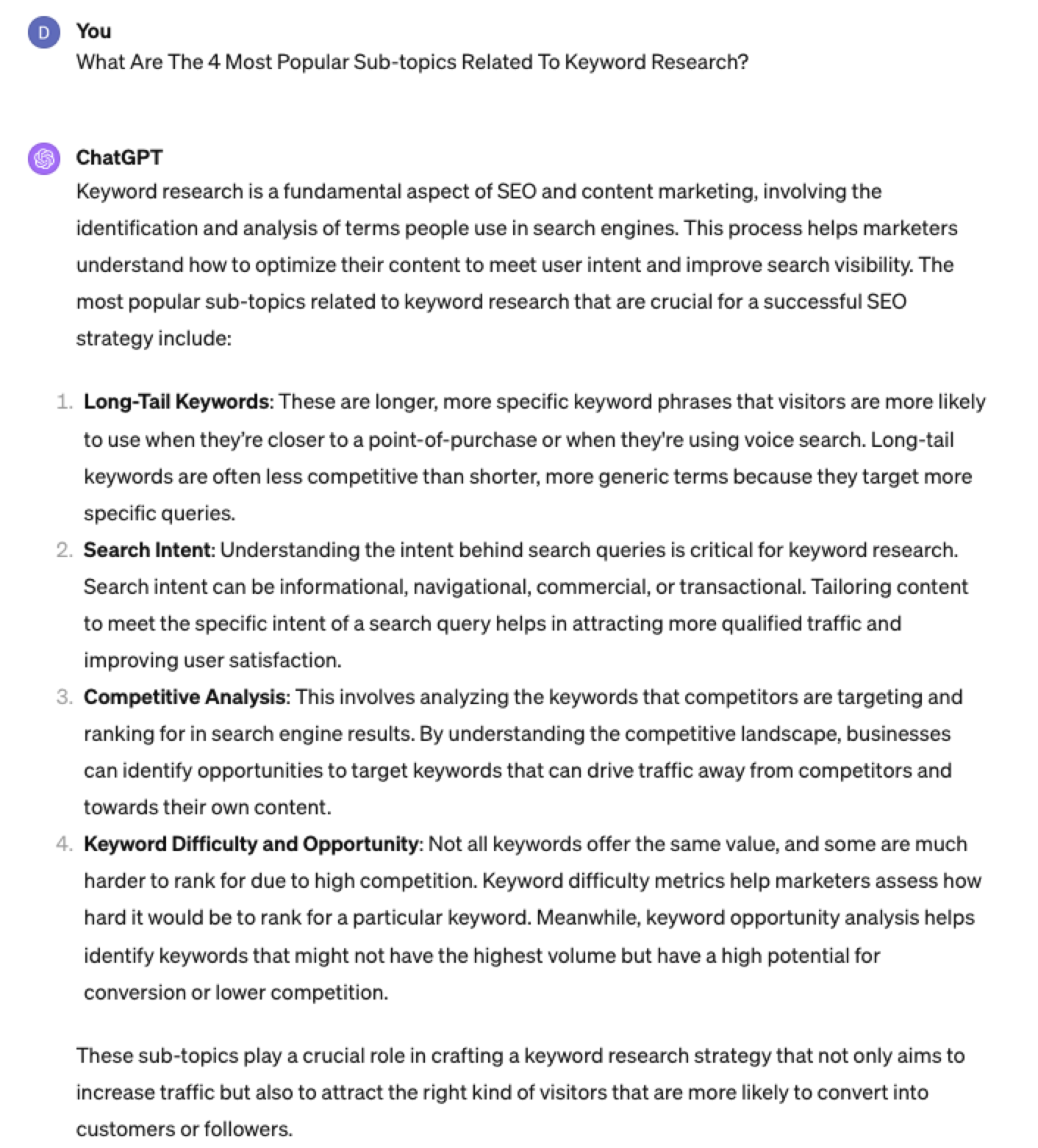 Screenshot from ChatGPT 4, April 2024
Screenshot from ChatGPT 4, April 2024Again, right on the money.
To get the keywords you want without having ChatGPT describe each answer, use the prompt “list without description.”
Here is an example of that.
List Without Description The Top {X} Most Popular Keywords For The Topic Of {X}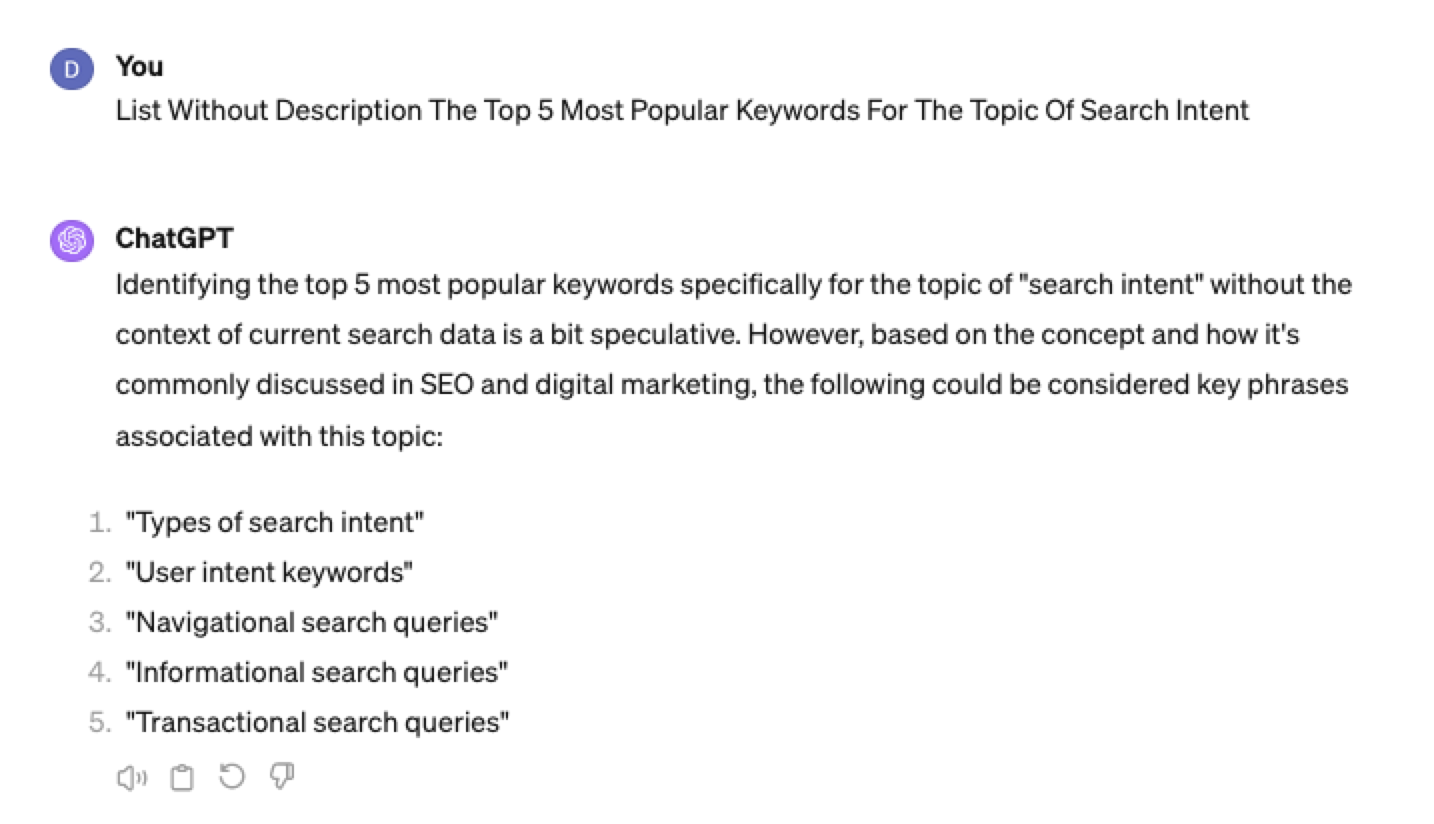
You can even branch these keywords out further into their long-tail.
Example prompt:
List Without Description The Top {X} Most Popular Long-tail Keywords For The Topic “{X}”
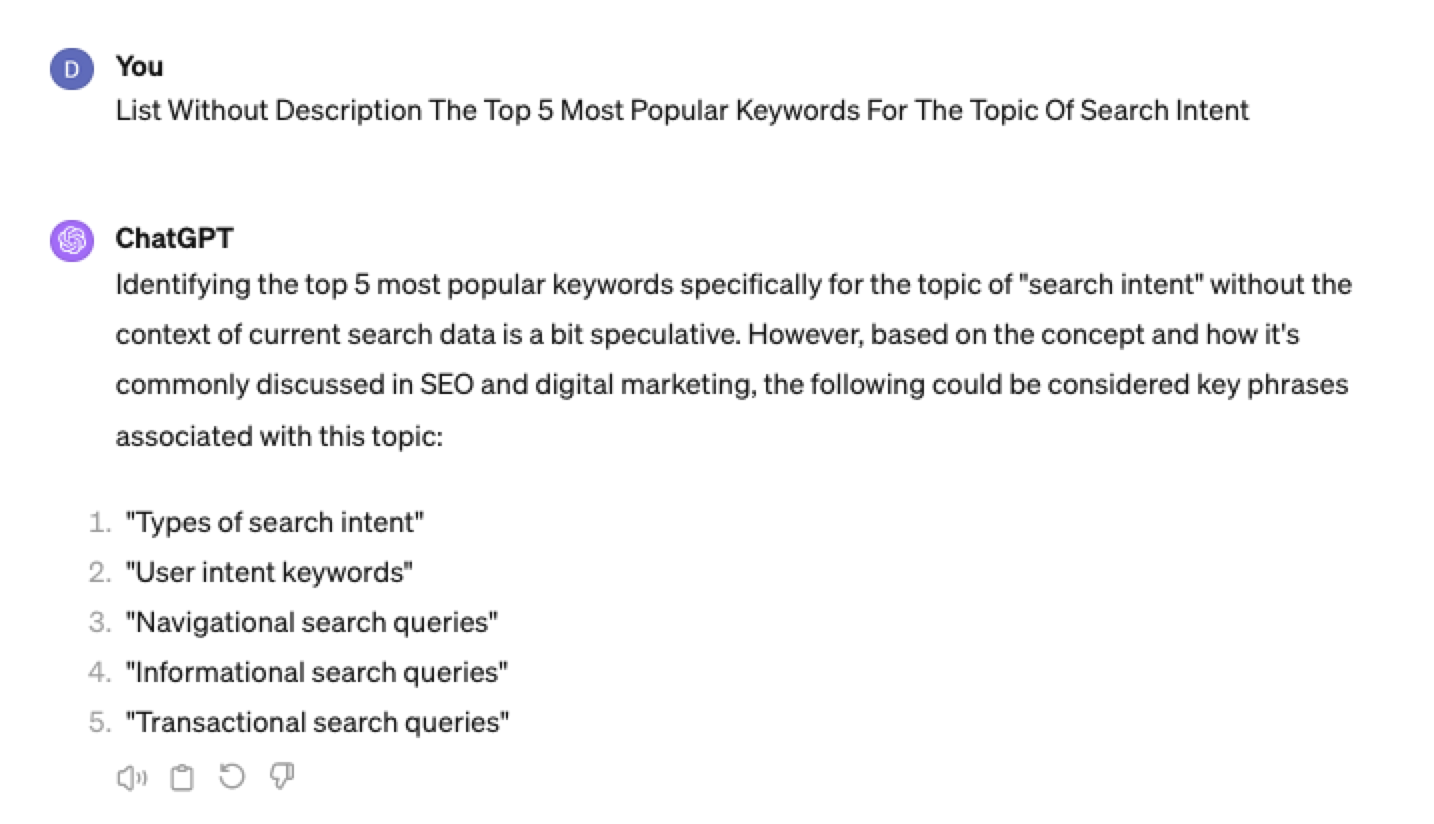 Screenshot ChatGPT 4,April 2024
Screenshot ChatGPT 4,April 2024List Without Description The Top Semantically Related Keywords And Entities For The Topic {X}
You can even ask ChatGPT what any topic’s semantically related keywords and entities are!
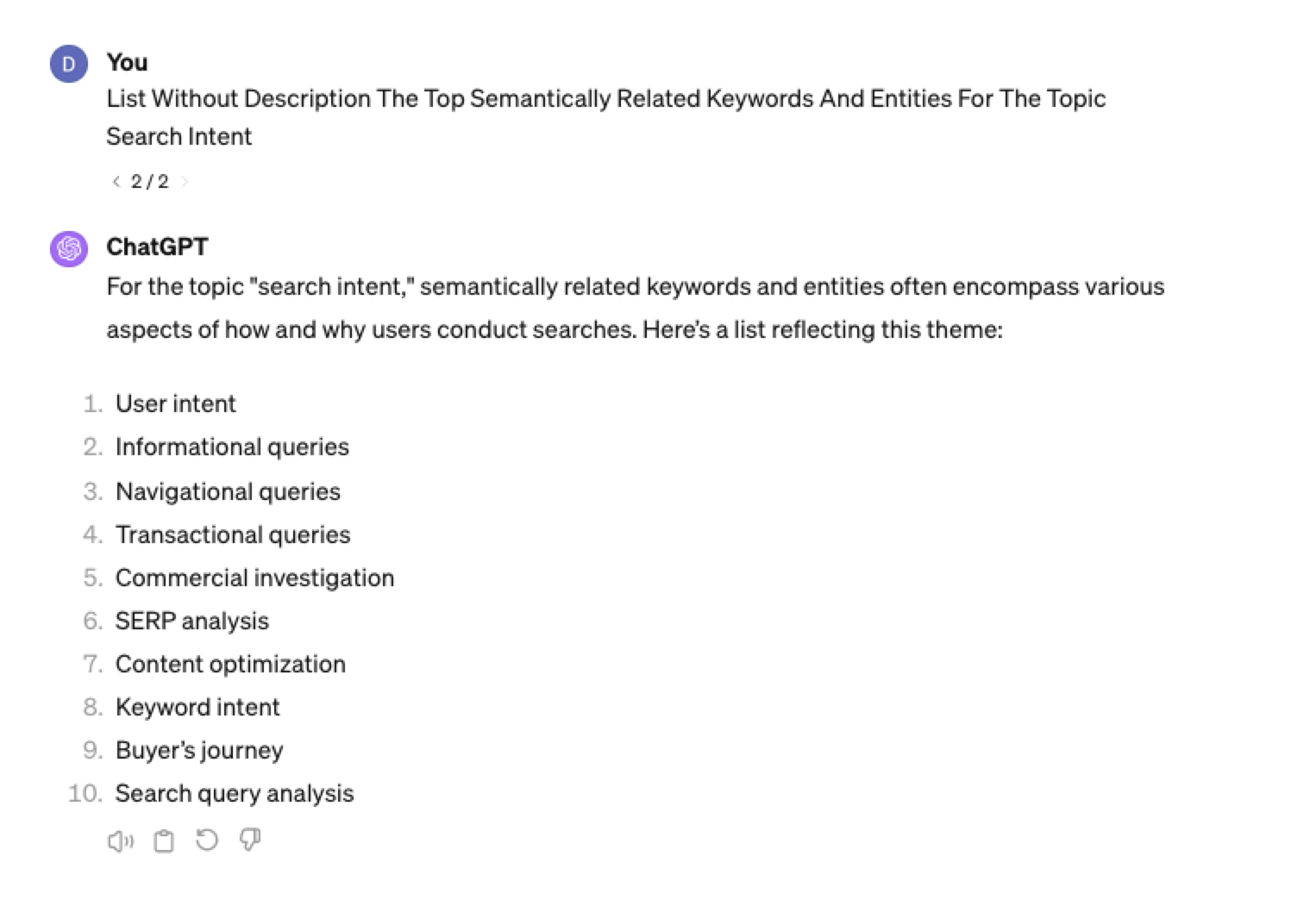 Screenshot ChatGPT 4, April 2024
Screenshot ChatGPT 4, April 2024Tip: The Onion Method Of Prompting ChatGPT
When you are happy with a series of prompts, add them all to one prompt. For example, so far in this article, we have asked ChatGPT the following:
- What are the four most popular sub-topics related to SEO?
- What are the four most popular sub-topics related to keyword research
- List without description the top five most popular keywords for “keyword intent”?
- List without description the top five most popular long-tail keywords for the topic “keyword intent types”?
- List without description the top semantically related keywords and entities for the topic “types of keyword intent in SEO.”
Combine all five into one prompt by telling ChatGPT to perform a series of steps. Example:
“Perform the following steps in a consecutive order Step 1, Step 2, Step 3, Step 4, and Step 5”
Example:
“Perform the following steps in a consecutive order Step 1, Step 2, Step 3, Step 4 and Step 5. Step 1 – Generate an answer for the 3 most popular sub-topics related to {Topic}?. Step 2 – Generate 3 of the most popular sub-topics related to each answer. Step 3 – Take those answers and list without description their top 3 most popular keywords. Step 4 – For the answers given of their most popular keywords, provide 3 long-tail keywords. Step 5 – for each long-tail keyword offered in the response, a list without descriptions 3 of their top semantically related keywords and entities.”
Generating Keyword Ideas Based On A Question
Taking the steps approach from above, we can get ChatGPT to help streamline getting keyword ideas based on a question. For example, let’s ask, “What is SEO?”
“Perform the following steps in a consecutive order Step 1, Step 2, Step 3, and Step 4. Step 1 Generate 10 questions about “{Question}”?. Step 2 – Generate 5 more questions about “{Question}” that do not repeat the above. Step 3 – Generate 5 more questions about “{Question}” that do not repeat the above. Step 4 – Based on the above Steps 1,2,3 suggest a final list of questions avoiding duplicates or semantically similar questions.”
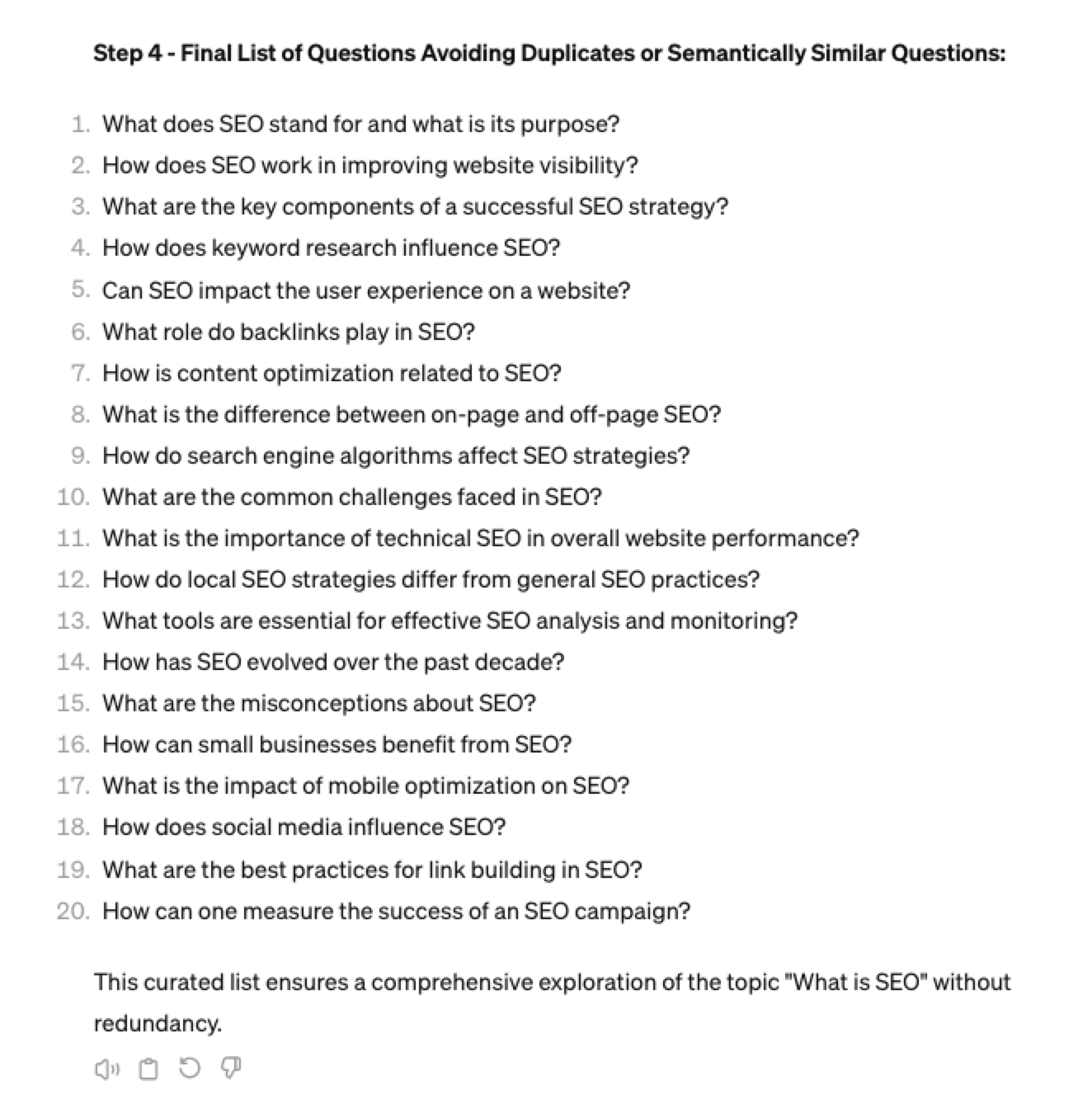 Screenshot ChatGPT 4, April 2024
Screenshot ChatGPT 4, April 2024Generating Keyword Ideas Using ChatGPT Based On The Alphabet Soup Method
One of my favorite methods, manually, without even using a keyword research tool, is to generate keyword research ideas from Google autocomplete, going from A to Z.
-
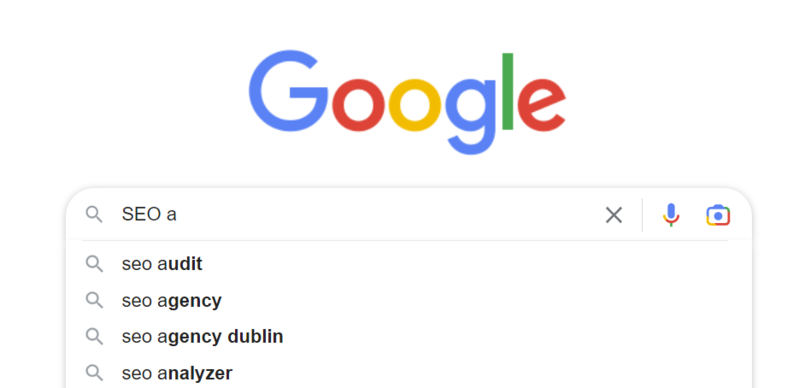 Screenshot from Google autocomplete, April 2024
Screenshot from Google autocomplete, April 2024
You can also do this using ChatGPT.
Example prompt:
“give me popular keywords that includes the keyword “SEO”, and the next letter of the word starts with a”
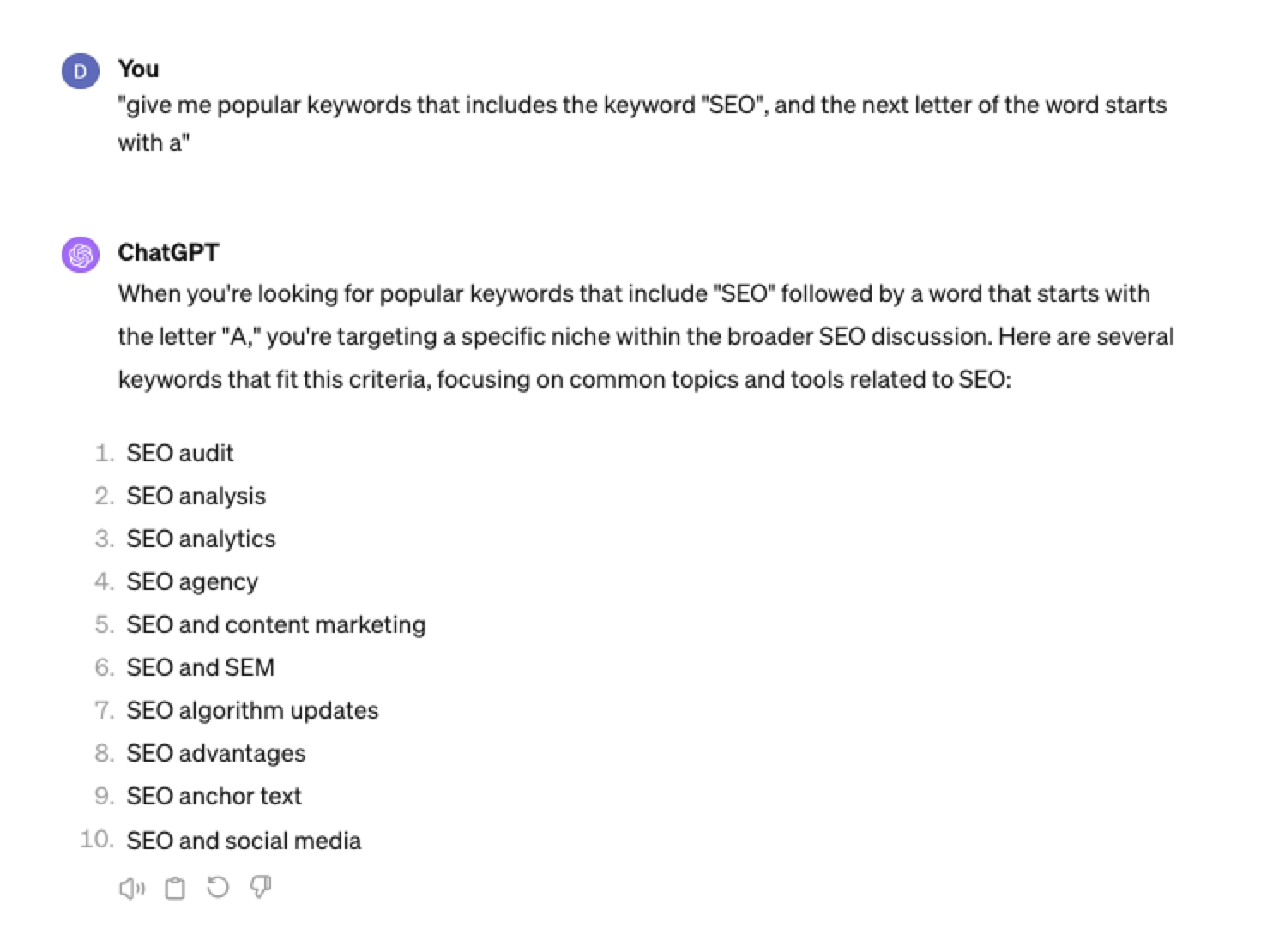 Screenshot from ChatGPT 4, April 2024
Screenshot from ChatGPT 4, April 2024Tip: Using the onion prompting method above, we can combine all this in one prompt.
“Give me five popular keywords that include “SEO” in the word, and the following letter starts with a. Once the answer has been done, move on to giving five more popular keywords that include “SEO” for each letter of the alphabet b to z.”
Generating Keyword Ideas Based On User Personas
When it comes to keyword research, understanding user personas is essential for understanding your target audience and keeping your keyword research focused and targeted. ChatGPT may help you get an initial understanding of customer personas.
Example prompt:
“For the topic of “{Topic}” list 10 keywords each for the different types of user personas”
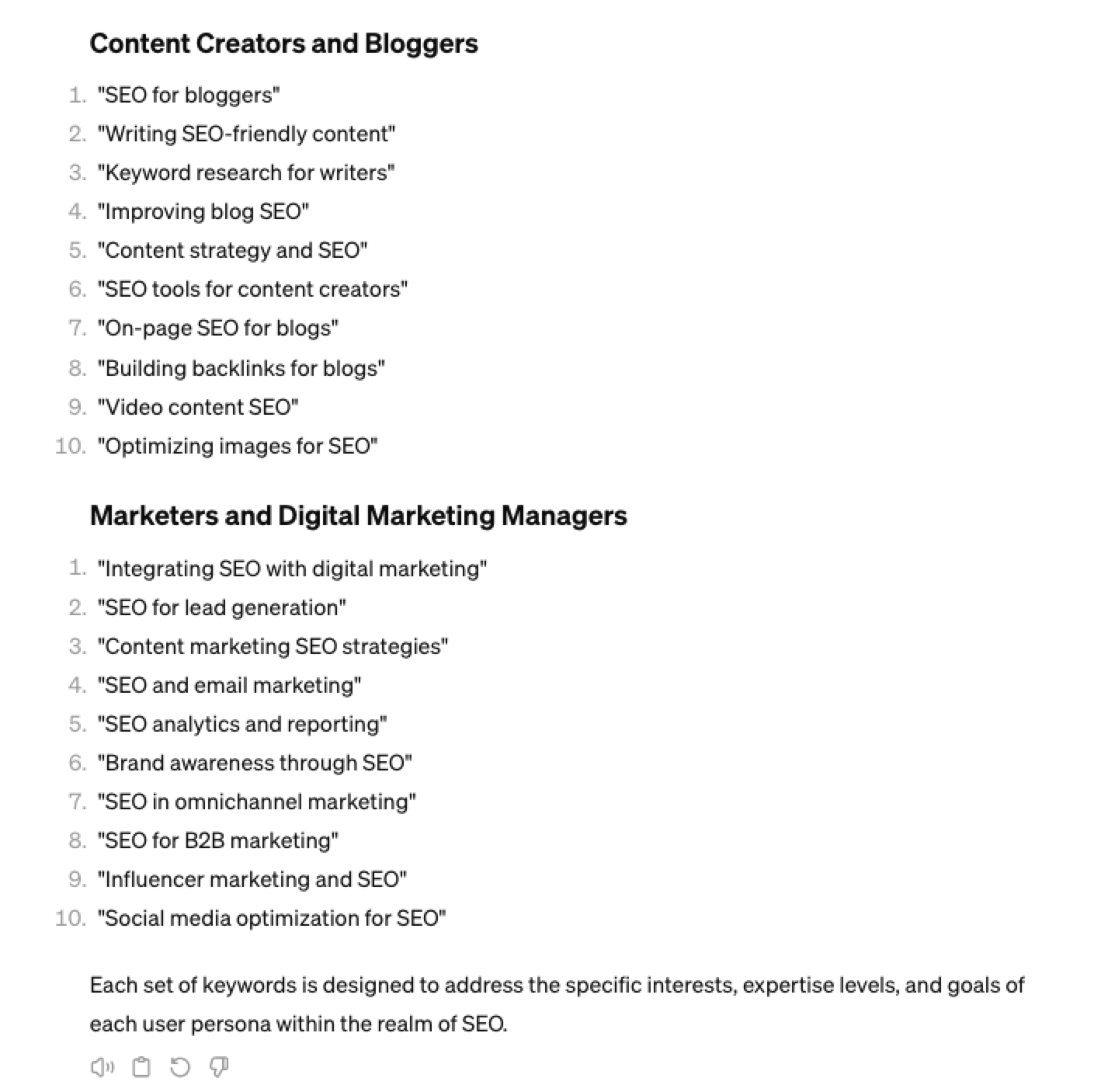 Screenshot from ChatGPT 4, April 2024
Screenshot from ChatGPT 4, April 2024You could even go a step further and ask for questions based on those topics that those specific user personas may be searching for:
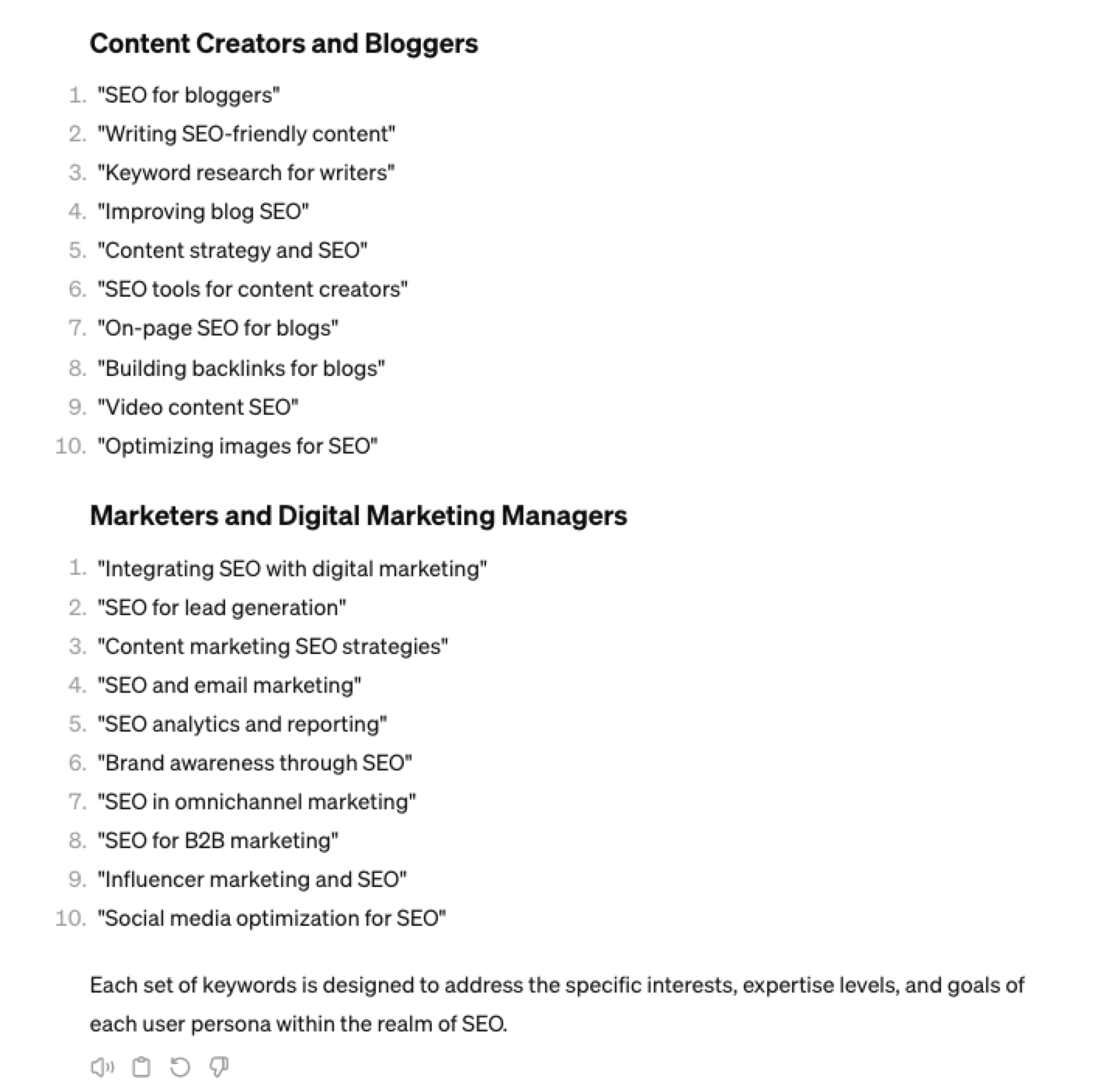 Screenshot ChatGPT 4, April 2024
Screenshot ChatGPT 4, April 2024As well as get the keywords to target based on those questions:
“For each question listed above for each persona, list the keywords, as well as the long-tail keywords to target, and put them in a table”
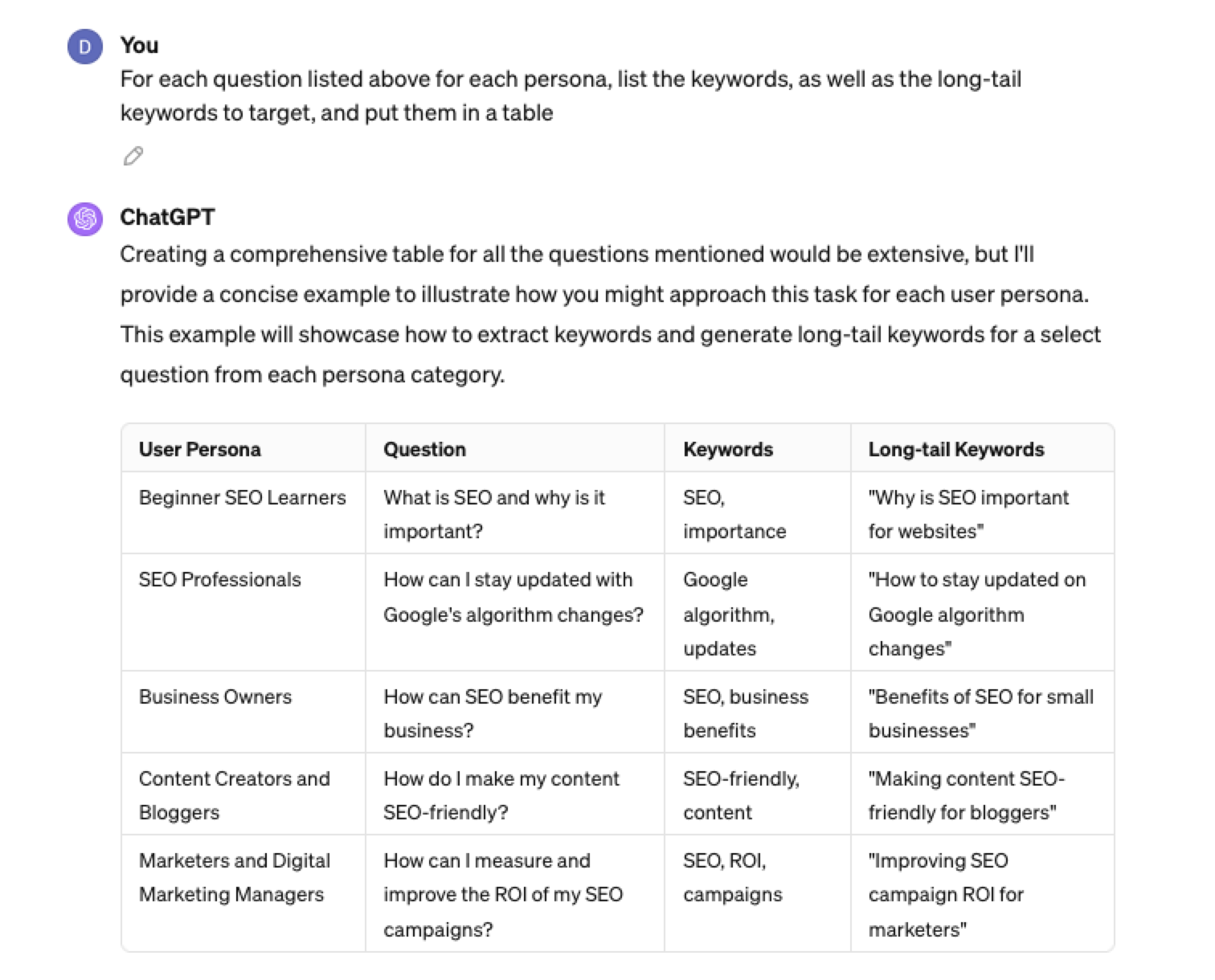 Screenshot from ChatGPT 4, April 2024
Screenshot from ChatGPT 4, April 2024Generating Keyword Ideas Using ChatGPT Based On Searcher Intent And User Personas
Understanding the keywords your target persona may be searching is the first step to effective keyword research. The next step is to understand the search intent behind those keywords and which content format may work best.
For example, a business owner who is new to SEO or has just heard about it may be searching for “what is SEO.”
However, if they are further down the funnel and in the navigational stage, they may search for “top SEO firms.”
You can query ChatGPT to inspire you here based on any topic and your target user persona.
SEO Example:
“For the topic of “{Topic}” list 10 keywords each for the different types of searcher intent that a {Target Persona} would be searching for”
ChatGPT For Keyword Research Admin
Here is how you can best use ChatGPT for keyword research admin tasks.
Using ChatGPT As A Keyword Categorization Tool
One of the use cases for using ChatGPT is for keyword categorization.
In the past, I would have had to devise spreadsheet formulas to categorize keywords or even spend hours filtering and manually categorizing keywords.
ChatGPT can be a great companion for running a short version of this for you.
Let’s say you have done keyword research in a keyword research tool, have a list of keywords, and want to categorize them.
You could use the following prompt:
“Filter the below list of keywords into categories, target persona, searcher intent, search volume and add information to a six-column table: List of keywords – [LIST OF KEYWORDS], Keyword Search Volume [SEARCH VOLUMES] and Keyword Difficulties [KEYWORD DIFFICUTIES].”
-
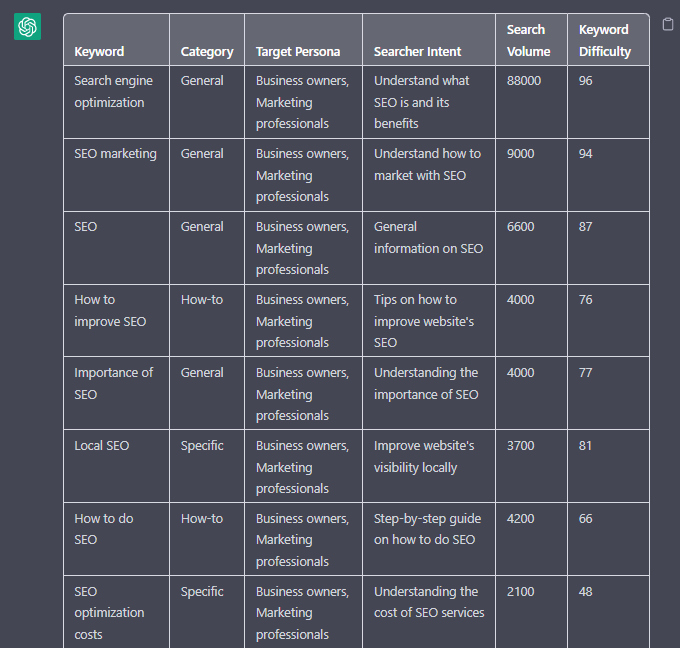 Screenshot from ChatGPT, April 2024
Screenshot from ChatGPT, April 2024
Tip: Add keyword metrics from the keyword research tools, as using the search volumes that a ChatGPT prompt may give you will be wildly inaccurate at best.
Using ChatGPT For Keyword Clustering
Another of ChatGPT’s use cases for keyword research is to help you cluster. Many keywords have the same intent, and by grouping related keywords, you may find that one piece of content can often target multiple keywords at once.
However, be careful not to rely only on LLM data for clustering. What ChatGPT may cluster as a similar keyword, the SERP or the user may not agree with. But it is a good starting point.
The big downside of using ChatGPT for keyword clustering is actually the amount of keyword data you can cluster based on the memory limits.
So, you may find a keyword clustering tool or script that is better for large keyword clustering tasks. But for small amounts of keywords, ChatGPT is actually quite good.
A great use small keyword clustering use case using ChatGPT is for grouping People Also Ask (PAA) questions.
Use the following prompt to group keywords based on their semantic relationships. For example:
“Organize the following keywords into groups based on their semantic relationships, and give a short name to each group: [LIST OF PAA], create a two-column table where each keyword sits on its own row.
-
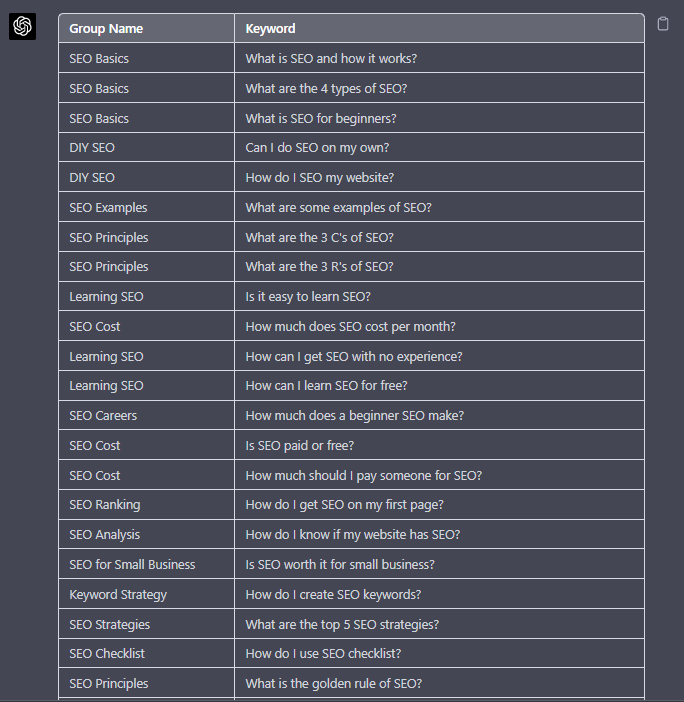 Screenshot from ChatGPT, April 2024
Screenshot from ChatGPT, April 2024
Using Chat GPT For Keyword Expansion By Patterns
One of my favorite methods of doing keyword research is pattern spotting.
Most seed keywords have a variable that can expand your target keywords.
Here are a few examples of patterns:
1. Question Patterns
(who, what, where, why, how, are, can, do, does, will)
“Generate [X] keywords for the topic “[Topic]” that contain any or all of the following “who, what, where, why, how, are, can, do, does, will”
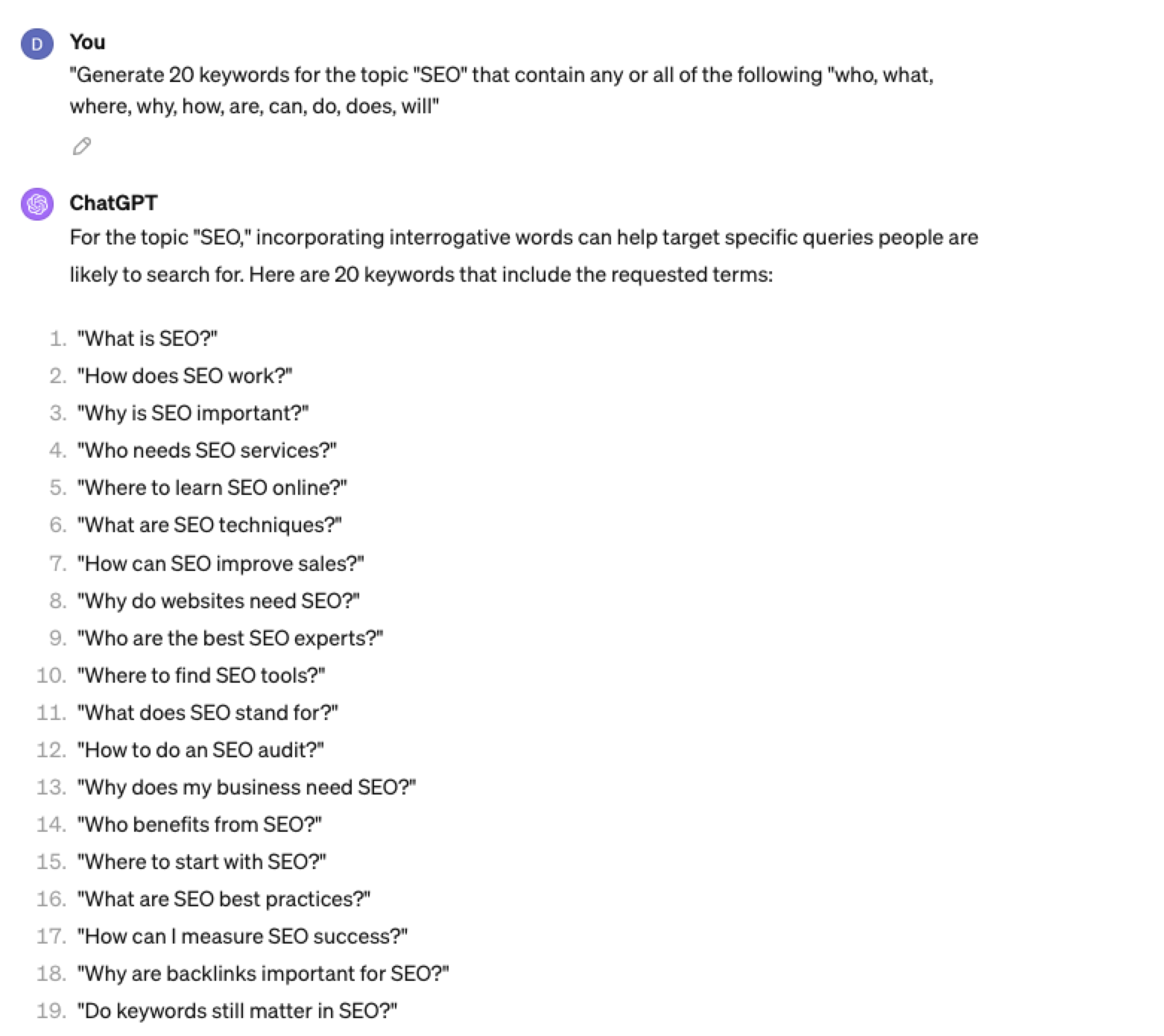 Screenshot ChatGPT 4, April 2024
Screenshot ChatGPT 4, April 20242. Comparison Patterns
Example:
“Generate 50 keywords for the topic “{Topic}” that contain any or all of the following “for, vs, alternative, best, top, review”
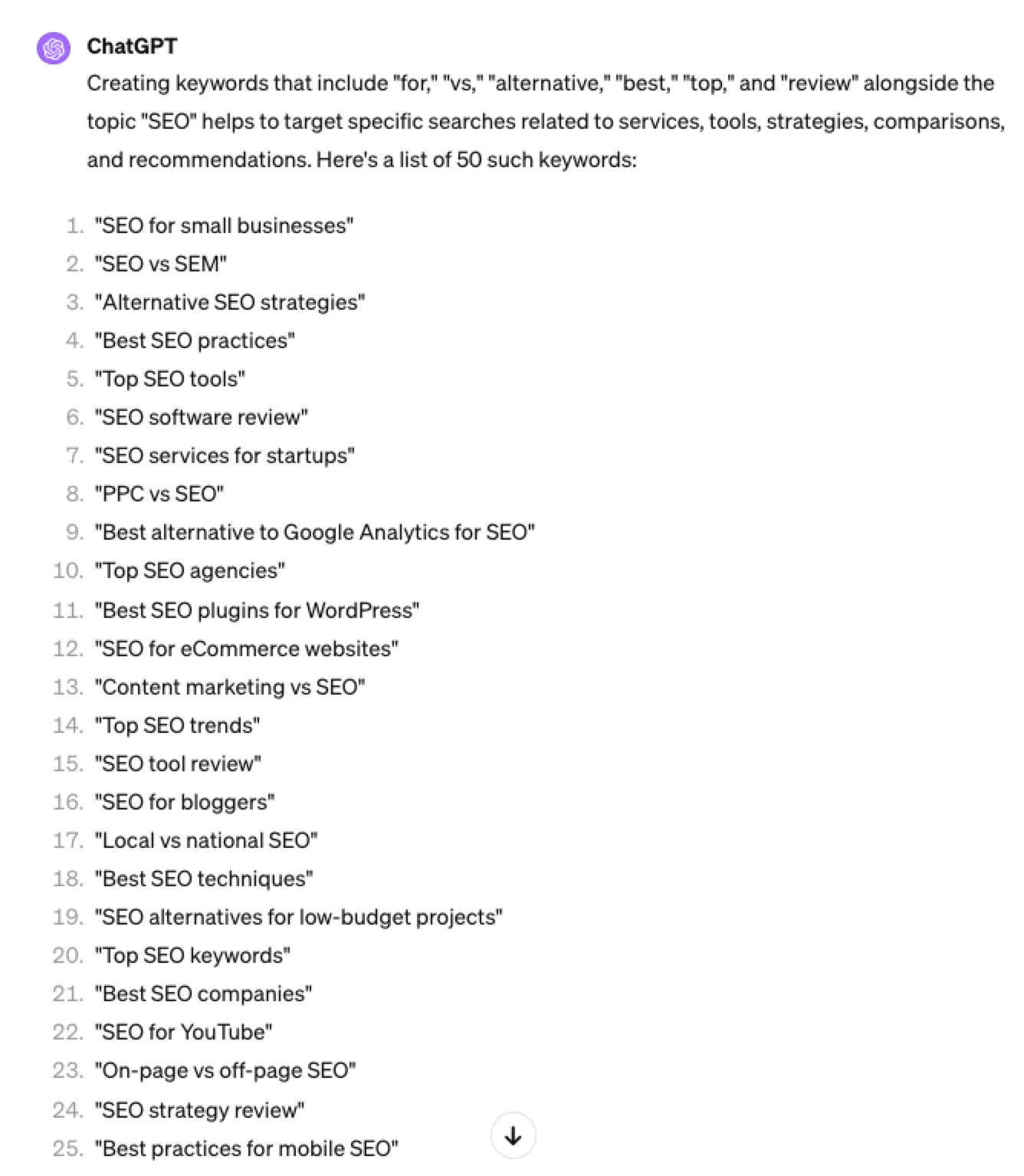 Screenshot ChatGPT 4, April 2024
Screenshot ChatGPT 4, April 20243. Brand Patterns
Another one of my favorite modifiers is a keyword by brand.
We are probably all familiar with the most popular SEO brands; however, if you aren’t, you could ask your AI friend to do the heavy lifting.
Example prompt:
“For the top {Topic} brands what are the top “vs” keywords”
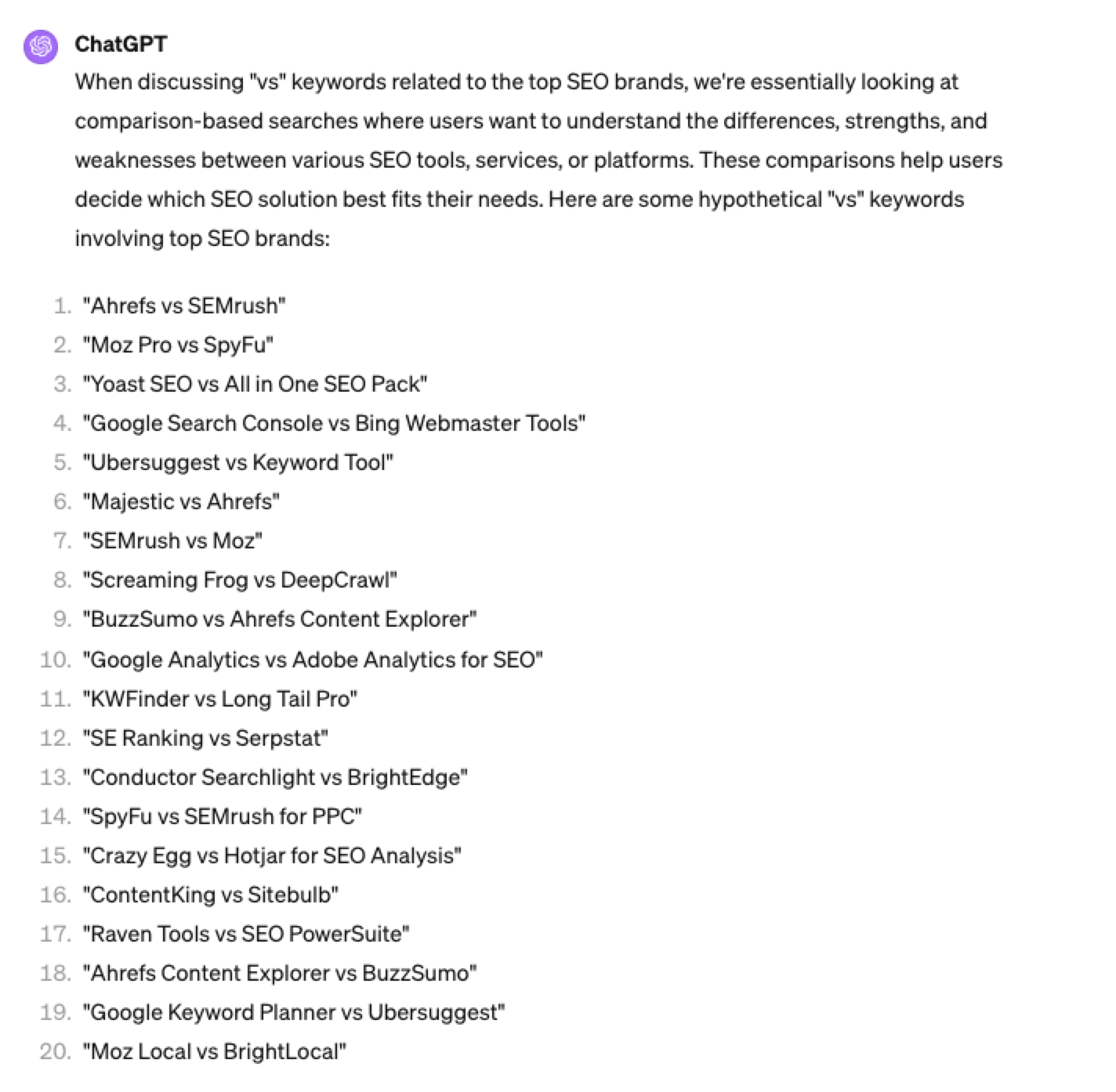 Screenshot ChatGPT 4, April 2024
Screenshot ChatGPT 4, April 20244. Search Intent Patterns
One of the most common search intent patterns is “best.”
When someone is searching for a “best {topic}” keyword, they are generally searching for a comprehensive list or guide that highlights the top options, products, or services within that specific topic, along with their features, benefits, and potential drawbacks, to make an informed decision.
Example:
“For the topic of “[Topic]” what are the 20 top keywords that include “best”
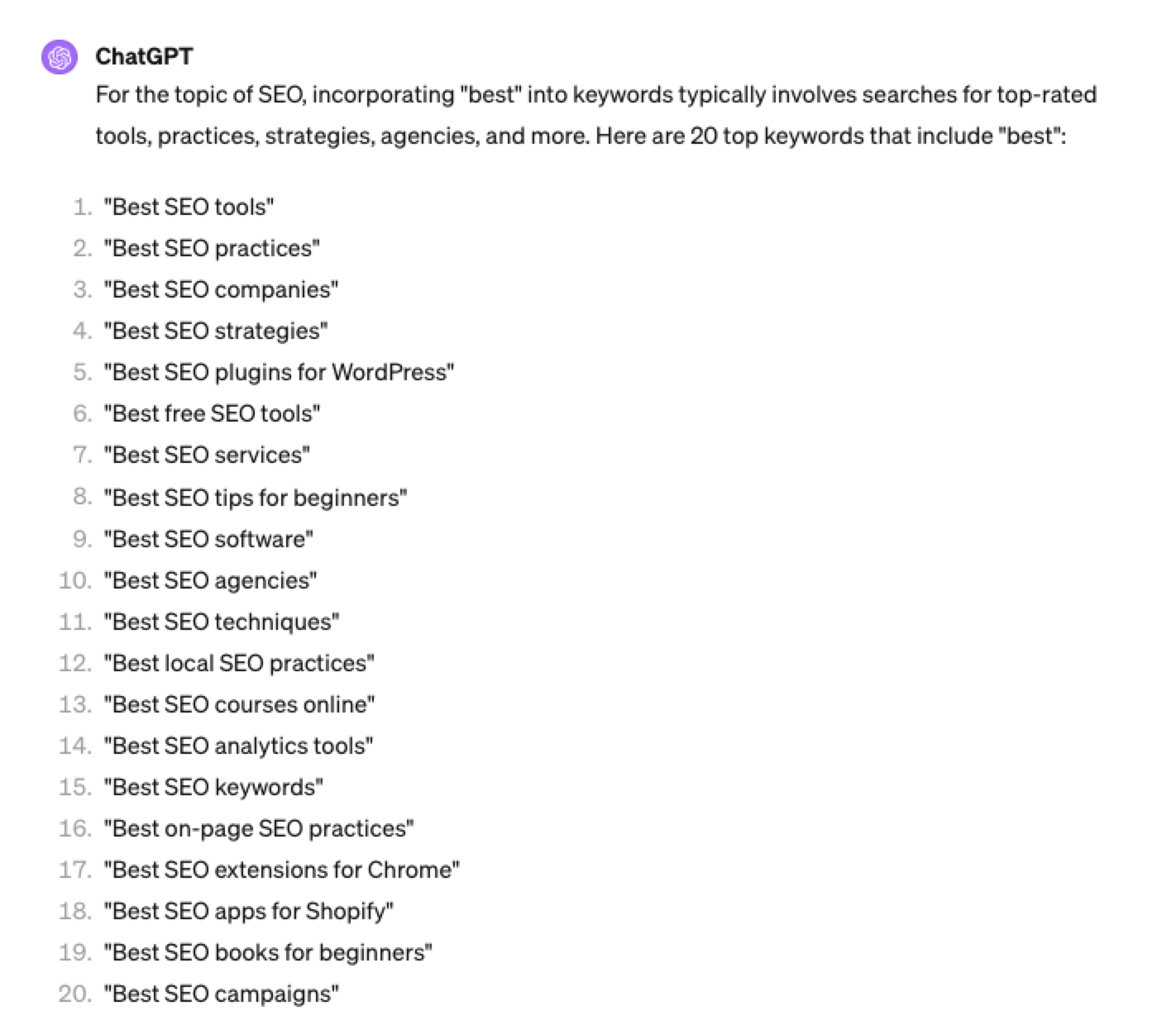 Screenshot ChatGPT 4, April 2024
Screenshot ChatGPT 4, April 2024Again, this guide to keyword research using ChatGPT has emphasized the ease of generating keyword research ideas by utilizing ChatGPT throughout the process.
Keyword Research Using ChatGPT Vs. Keyword Research Tools
Free Vs. Paid Keyword Research Tools
Like keyword research tools, ChatGPT has free and paid options.
However, one of the most significant drawbacks of using ChatGPT for keyword research alone is the absence of SEO metrics to help you make smarter decisions.
To improve accuracy, you could take the results it gives you and verify them with your classic keyword research tool – or vice versa, as shown above, uploading accurate data into the tool and then prompting.
However, you must consider how long it takes to type and fine-tune your prompt to get your desired data versus using the filters within popular keyword research tools.
For example, if we use a popular keyword research tool using filters, you could have all of the “best” queries with all of their SEO metrics:
-
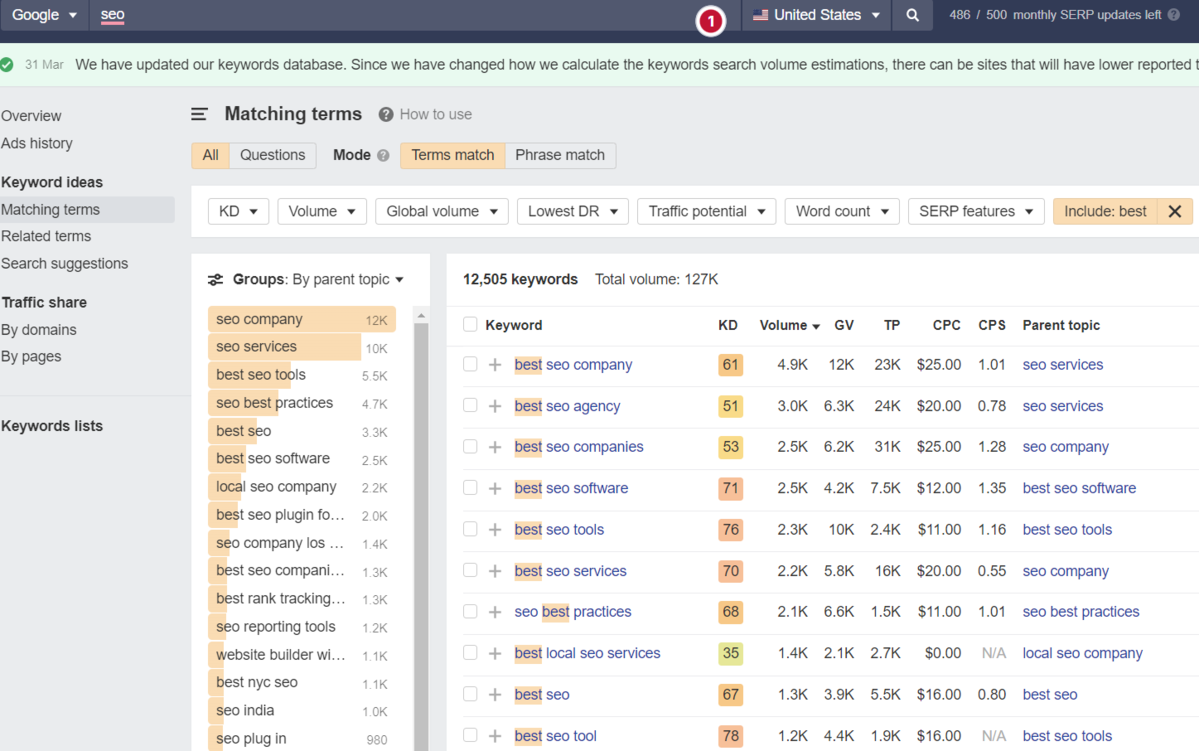 Screenshot from Ahrefs Keyword Explorer, March 2024
Screenshot from Ahrefs Keyword Explorer, March 2024
And unlike ChatGPT, generally, there is no token limit; you can extract several hundred, if not thousands, of keywords at a time.
As I have mentioned multiple times throughout this piece, you cannot blindly trust the data or SEO metrics it may attempt to provide you with.
The key is to validate the keyword research with a keyword research tool.
ChatGPT For International SEO Keyword Research
ChatGPT can be a terrific multilingual keyword research assistant.
For example, if you wanted to research keywords in a foreign language such as French. You could ask ChatGPT to translate your English keywords;
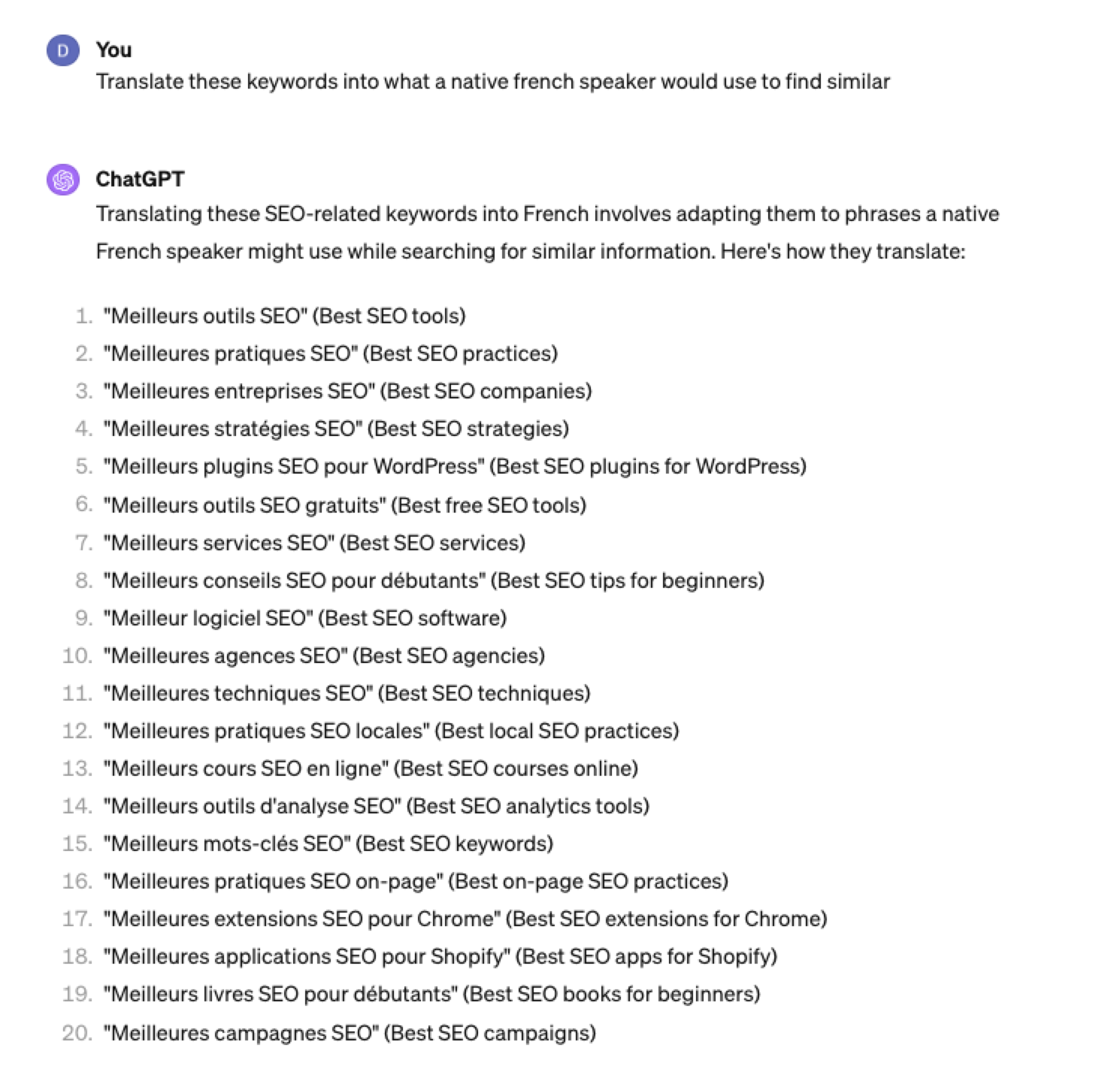 Screenshot ChatGPT 4, Apil 2024
Screenshot ChatGPT 4, Apil 2024- The key is to take the data above and paste it into a popular keyword research tool to verify.
- As you can see below, many of the keyword translations for the English keywords do not have any search volume for direct translations in French.
 Screenshot from Ahrefs Keyword Explorer, April 2024
Screenshot from Ahrefs Keyword Explorer, April 2024But don’t worry, there is a workaround: If you have access to a competitor keyword research tool, you can see what webpage is ranking for that query – and then identify the top keyword for that page based on the ChatGPT translated keywords that do have search volume.
-
-
 Screenshot from Ahrefs Keyword Explorer, April 2024
Screenshot from Ahrefs Keyword Explorer, April 2024
Or, if you don’t have access to a paid keyword research tool, you could always take the top-performing result, extract the page copy, and then ask ChatGPT what the primary keyword for the page is.
Key Takeaway
-
ChatGPT can be an expert on any topic and an invaluable keyword research tool. However, it is another tool to add to your toolbox when doing keyword research; it does not replace traditional keyword research tools.
As shown throughout this tutorial, from making up keywords at the beginning to inaccuracies around data and translations, ChatGPT can make mistakes when used for keyword research.
You cannot blindly trust the data you get back from ChatGPT.
However, it can offer a shortcut to understanding any topic for which you need to do keyword research and, as a result, save you countless hours.
But the key is how you prompt.
The prompts I shared with you above will help you understand a topic in minutes instead of hours and allow you to better seed keywords using keyword research tools.
It can even replace mundane keyword clustering tasks that you used to do with formulas in spreadsheets or generate ideas based on keywords you give it.
Paired with traditional keyword research tools, ChatGPT for keyword research can be a powerful tool in your arsenal.
More resources:
Featured Image: Tatiana Shepeleva/Shutterstock
SEO
OpenAI Expected to Integrate Real-Time Data In ChatGPT

Sam Altman, CEO of OpenAI, dispelled rumors that a new search engine would be announced on Monday, May 13. Recent deals have raised the expectation that OpenAI will announce the integration of real-time content from English, Spanish, and French publications into ChatGPT, complete with links to the original sources.
OpenAI Search Is Not Happening
Many competing search engines have tried and failed to challenge Google as the leading search engine. A new wave of hybrid generative AI search engines is currently trying to knock Google from the top spot with arguably very little success.
Sam Altman is on record saying that creating a search engine to compete against Google is not a viable approach. He suggested that technological disruption was the way to replace Google by changing the search paradigm altogether. The speculation that Altman is going to announce a me-too search engine on Monday never made sense given his recent history of dismissing the concept as a non-starter.
So perhaps it’s not a surprise that he recently ended the speculation by explicitly saying that he will not be announcing a search engine on Monday.
He tweeted:
“not gpt-5, not a search engine, but we’ve been hard at work on some new stuff we think people will love! feels like magic to me.”
“New Stuff” May Be Iterative Improvement
It’s quite likely that what’s going to be announced is iterative which means it improves ChatGPT but not replaces it. This fits into how Altman recently expressed his approach with ChatGPT.
He remarked:
“And it does kind of suck to ship a product that you’re embarrassed about, but it’s much better than the alternative. And in this case in particular, where I think we really owe it to society to deploy iteratively.
There could totally be things in the future that would change where we think iterative deployment isn’t such a good strategy, but it does feel like the current best approach that we have and I think we’ve gained a lot from from doing this and… hopefully the larger world has gained something too.”
Improving ChatGPT iteratively is Sam Altman’s preference and recent clues point to what those changes may be.
Recent Deals Contain Clues
OpenAI has been making deals with news media and User Generated Content publishers since December 2023. Mainstream media has reported these deals as being about licensing content for training large language models. But they overlooked a a key detail that we reported on last month which is that these deals give OpenAI access to real-time information that they stated will be used to give attribution to that real-time data in the form of links.
That means that ChatGPT users will gain the ability to access real-time news and to use that information creatively within ChatGPT.
Dotdash Meredith Deal
Dotdash Meredith (DDM) is the publisher of big brand publications such as Better Homes & Gardens, FOOD & WINE, InStyle, Investopedia, and People magazine. The deal that was announced goes way beyond using the content as training data. The deal is explicitly about surfacing the Dotdash Meredith content itself in ChatGPT.
The announcement stated:
“As part of the agreement, OpenAI will display content and links attributed to DDM in relevant ChatGPT responses. …This deal is a testament to the great work OpenAI is doing on both fronts to partner with creators and publishers and ensure a healthy Internet for the future.
Over 200 million Americans each month trust our content to help them make decisions, solve problems, find inspiration, and live fuller lives. This partnership delivers the best, most relevant content right to the heart of ChatGPT.”
A statement from OpenAI gives credibility to the speculation that OpenAI intends to directly show licensed third-party content as part of ChatGPT answers.
OpenAI explained:
“We’re thrilled to partner with Dotdash Meredith to bring its trusted brands to ChatGPT and to explore new approaches in advancing the publishing and marketing industries.”
Something that DDM also gets out of this deal is that OpenAI will enhance DDM’s in-house ad targeting in order show more tightly focused contextual advertising.
Le Monde And Prisa Media Deals
In March 2024 OpenAI announced a deal with two global media companies, Le Monde and Prisa Media. Le Monde is a French news publication and Prisa Media is a Spanish language multimedia company. The interesting aspects of these two deals is that it gives OpenAI access to real-time data in French and Spanish.
Prisa Media is a global Spanish language media company based in Madrid, Spain that is comprised of magazines, newspapers, podcasts, radio stations, and television networks. It’s reach extends from Spain to America. American media companies include publications in the United States, Argentina, Bolivia, Chile, Colombia, Costa Rica, Ecuador, Mexico, and Panama. That is a massive amount of real-time information in addition to a massive audience of millions.
OpenAI explicitly announced that the purpose of this deal was to bring this content directly to ChatGPT users.
The announcement explained:
“We are continually making improvements to ChatGPT and are supporting the essential role of the news industry in delivering real-time, authoritative information to users. …Our partnerships will enable ChatGPT users to engage with Le Monde and Prisa Media’s high-quality content on recent events in ChatGPT, and their content will also contribute to the training of our models.”
That deal is not just about training data. It’s about bringing current events data to ChatGPT users.
The announcement elaborated in more detail:
“…our goal is to enable ChatGPT users around the world to connect with the news in new ways that are interactive and insightful.”
As noted in our April 30th article that revealed that OpenAI will show links in ChatGPT, OpenAI intends to show third party content with links to that content.
OpenAI commented on the purpose of the Le Monde and Prisa Media partnership:
“Over the coming months, ChatGPT users will be able to interact with relevant news content from these publishers through select summaries with attribution and enhanced links to the original articles, giving users the ability to access additional information or related articles from their news sites.”
There are additional deals with other groups like The Financial Times which also stress that this deal will result in a new ChatGPT feature that will allow users to interact with real-time news and current events .
OpenAI’s Monday May 13 Announcement
There are many clues that the announcement on Monday will be that ChatGPT users will gain the ability to interact with content about current events. This fits into the terms of recent deals with news media organizations. There may be other features announced as well but this part is something that there are many clues pointing to.
Watch Altman’s interview at Stanford University
Featured Image by Shutterstock/photosince
SEO
Google’s Strategies For Dealing With Content Decay

In the latest episode of the Search Off The Record podcast, Google Search Relations team members John Mueller and Lizzi Sassman did a deep dive into dealing with “content decay” on websites.
Outdated content is a natural issue all sites face over time, and Google has outlined strategies beyond just deleting old pages.
While removing stale content is sometimes necessary, Google recommends taking an intentional, format-specific approach to tackling content decay.
Archiving vs. Transitional Guides
Google advises against immediately removing content that becomes obsolete, like materials referencing discontinued products or services.
Removing content too soon could confuse readers and lead to a poor experience, Sassman explains:
“So, if I’m trying to find out like what happened, I almost need that first thing to know. Like, “What happened to you?” And, otherwise, it feels almost like an error. Like, “Did I click a wrong link or they redirect to the wrong thing?””
Sassman says you can avoid confusion by providing transitional “explainer” pages during deprecation periods.
A temporary transition guide informs readers of the outdated content while steering them toward updated resources.
Sassman continues:
“That could be like an intermediary step where maybe you don’t do that forever, but you do it during the transition period where, for like six months, you have them go funnel them to the explanation, and then after that, all right, call it a day. Like enough people know about it. Enough time has passed. We can just redirect right to the thing and people aren’t as confused anymore.”
When To Update Vs. When To Write New Content
For reference guides and content that provide authoritative overviews, Google suggests updating information to maintain accuracy and relevance.
However, for archival purposes, major updates may warrant creating a new piece instead of editing the original.
Sassman explains:
“I still want to retain the original piece of content as it was, in case we need to look back or refer to it, and to change it or rehabilitate it into a new thing would almost be worth republishing as a new blog post if we had that much additional things to say about it.”
Remove Potentially Harmful Content
Google recommends removing pages in cases where the outdated information is potentially harmful.
Sassman says she arrived at this conclusion when deciding what to do with a guide involving obsolete structured data:
“I think something that we deleted recently was the “How to Structure Data” documentation page, which I thought we should just get rid of it… it almost felt like that’s going to be more confusing to leave it up for a period of time.
And actually it would be negative if people are still adding markup, thinking they’re going to get something. So what we ended up doing was just delete the page and redirect to the changelog entry so that, if people clicked “How To Structure Data” still, if there was a link somewhere, they could still find out what happened to that feature.”
Internal Auditing Processes
To keep your content current, Google advises implementing a system for auditing aging content and flagging it for review.
Sassman says she sets automated alerts for pages that haven’t been checked in set periods:
“Oh, so we have a little robot to come and remind us, “Hey, you should come investigate this documentation page. It’s been x amount of time. Please come and look at it again to make sure that all of your links are still up to date, that it’s still fresh.””
Context Is Key
Google’s tips for dealing with content decay center around understanding the context of outdated materials.
You want to prevent visitors from stumbling across obsolete pages without clarity.
Additional Google-recommended tactics include:
- Prominent banners or notices clarifying a page’s dated nature
- Listing original publish dates
- Providing inline annotations explaining how older references or screenshots may be obsolete
How This Can Help You
Following Google’s recommendations for tackling content decay can benefit you in several ways:
- Improved user experience: By providing clear explanations, transition guides, and redirects, you can ensure that visitors don’t encounter confusing or broken pages.
- Maintained trust and credibility: Removing potentially harmful or inaccurate content and keeping your information up-to-date demonstrates your commitment to providing reliable and trustworthy resources.
- Better SEO: Regularly auditing and updating your pages can benefit your website’s search rankings and visibility.
- Archival purposes: By creating new content instead of editing older pieces, you can maintain a historical record of your website’s evolution.
- Streamlined content management: Implementing internal auditing processes makes it easier to identify and address outdated or problematic pages.
By proactively tackling content decay, you can keep your website a valuable resource, improve SEO, and maintain an organized content library.
Listen to the full episode of Google’s podcast below:
Featured Image: Stokkete/Shutterstock
-

 PPC5 days ago
PPC5 days agoHow the TikTok Algorithm Works in 2024 (+9 Ways to Go Viral)
-

 MARKETING6 days ago
MARKETING6 days agoA Recap of Everything Marketers & Advertisers Need to Know
-

 SEO6 days ago
SEO6 days agoBlog Post Checklist: Check All Prior to Hitting “Publish”
-

 SEO4 days ago
SEO4 days agoHow to Use Keywords for SEO: The Complete Beginner’s Guide
-

 MARKETING5 days ago
MARKETING5 days agoHow To Protect Your People and Brand
-

 SEARCHENGINES6 days ago
SEARCHENGINES6 days agoGoogle Started Enforcing The Site Reputation Abuse Policy
-

 PPC6 days ago
PPC6 days agoHow to Craft Compelling Google Ads for eCommerce
-
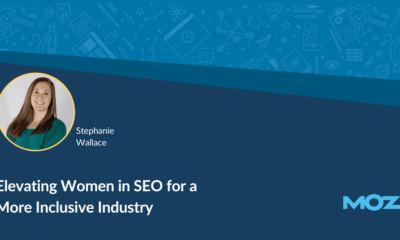
 MARKETING6 days ago
MARKETING6 days agoElevating Women in SEO for a More Inclusive Industry




